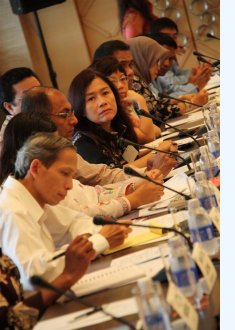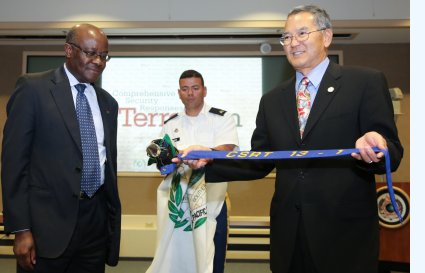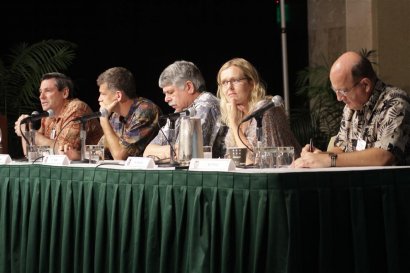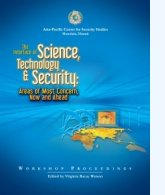Building An Effective Security Sector Through Inclusion |
 A workshop on “Building an Effective Security Sector through Inclusion” was held March 12-14, 2013 in Nha Trang, Vietnam. Hosted by the Asia-Pacific Center for Security Studies (APCSS), in partnership with the Diplomatic Academy of Vietnam’s Institute of Foreign Policy and Strategic Studies, the multilateral workshop focused on key considerations and opportunities to build effective security sectors in the Asia-Pacific through the inclusion of diverse viewpoints and perspectives. A workshop on “Building an Effective Security Sector through Inclusion” was held March 12-14, 2013 in Nha Trang, Vietnam. Hosted by the Asia-Pacific Center for Security Studies (APCSS), in partnership with the Diplomatic Academy of Vietnam’s Institute of Foreign Policy and Strategic Studies, the multilateral workshop focused on key considerations and opportunities to build effective security sectors in the Asia-Pacific through the inclusion of diverse viewpoints and perspectives.
“Expanding the role and impact of women in security is not a women’s issue, but an essential part of achieving the goals of good governance and effective leadership,” stated Dr. Lori Forman, workshop academic lead. “Both men and women must contribute to these goals: success is found through mutual deliberation of the issues and joint development of the recommendations.” Read more... |
|
Eighty-five complete CSRT 13-1 |
Eighty-five Fellows from 40 locations recently graduated from the Comprehensive Security Responses to Terrorism (CSRT) Course. Of the 85 participants, 70 percent were from military organizations with others representing law enforcement, intelligence, foreign affairs, and the United Nations. Three-fifths were from the Asia-Pacific region, with five continents participating in the course. Read more...

Senior course Fellow Mr. Zaddock Madiri Syong'oh of Kenya with APCSS Deputy Director retired Brig. Gen. Jim Hirai. |
|
College News & Publications |
|
APCSS faculty holds panel at PACOM conference |

APCSS faculty members, led by Deputy Dean Army Col. (Ret.) Dave Shanahan held a panel session as part of U.S. Pacific Command’s Science and Technology Conference (S&T) March 5 at the Hawaiian Hilton Village in Honolulu.
The APCSS faculty team briefed on Energy Security Issues (Dr. Bill Wieninger), Climate Change & Environmental Security Issues (Dr. Scott Hauger), Maritime Security Issues (Prof. Kerry Lynn Nankivell) and Information Technology & Cyber Security Issues (Prof. Butch Finley). APCSS Director Lt. Gen. (Ret.) Dan Leaf also briefed participants on the APCSS mission and the “Rebalance” of the Asia-Pacific region. |
|
|
|
Advanced Security Cooperation (ASC)
Apr. 4 - May 8
U.S-South Asia Leader Engagement Program: Charting the Water Future of South Asia
With Harvard Kennedy School and Near East South Asia (NESA) Center
Apr. 28 to May 3 in Cambridge, Mass.
Maritime Cooperation in the Indo-Pacific Region: China, India, and U.S. Perspectives
May 21-23 in Honolulu, HI.
See APCSS Calendar |
|
Over the last few months many subscribers within DoD have gotten new email addresses.
If you have a new email please update your subscription to ensure you are getting the latest APCSS updates. Mahalo.
If you have any questions please contact the editor at markovinovicm@apcss.org |
|
Recently, APCSS was pleased to host orientation visits by a number of distinguished visitors/groups including:
Ambassador Rick Barton, Assistant Secretary of State for Conflict and Stabilization Operations and Coordinator for Reconstruction and Stabilization
Advanced Operational Art Studies (AOAS)
Mr. Andrew Yang, Taiwan Vice Minister of Defense
Mr. Tyson Sara, Assistant Secretary for the Pacific and Timor-Leste, International Policy Division, Australian Dept of Defense
Air War College
International Intelligence Fellows Program
Lt. Gen. Vinod Bhatia, DGMO, and Maj. Gen. Gurdeep Singh, Director of International Cooperation
General David Hurley, Chief of Defense Force, Australia
Vice Admiral Scott Swift, Commander, 7th Fleet
|
|
APCSS hosts a number of Communities of Interest on APCSSLink, also known as GlobalNet:
These communities are open to all APCSS Alumni. Please note you must be logged onto APCSSLink for these links to work properly. |
|
 The volume, “The Interface of Science, Technology & Security,” edited Virginia Watson, Ph.D., is the latest publication produced by the Asia-Pacific Center for Security Studies. The eBook includes updated papers from an APCSS science & technology (S&T) workshop which identified and assessed the most significant current and emerging scientific and technological developments, evaluated their impact on international security, and recommended priority S&T and security policy agenda items based on Asia-Pacific perspectives. Click here to access the book in its entirety and by chapter. The volume, “The Interface of Science, Technology & Security,” edited Virginia Watson, Ph.D., is the latest publication produced by the Asia-Pacific Center for Security Studies. The eBook includes updated papers from an APCSS science & technology (S&T) workshop which identified and assessed the most significant current and emerging scientific and technological developments, evaluated their impact on international security, and recommended priority S&T and security policy agenda items based on Asia-Pacific perspectives. Click here to access the book in its entirety and by chapter.
|
|
|


